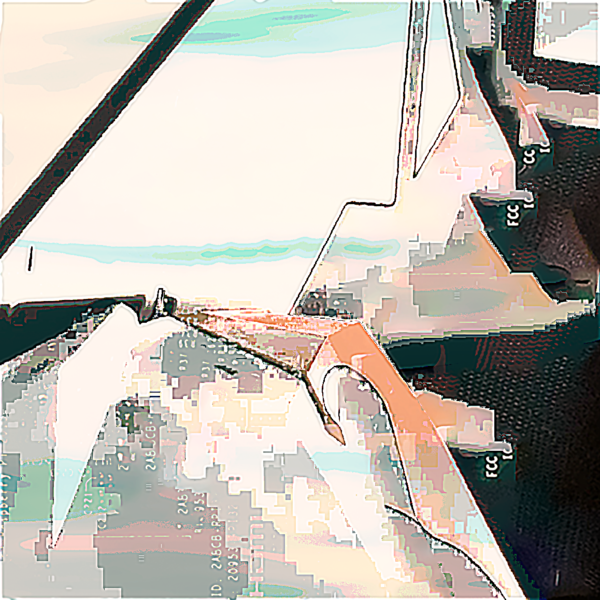
Visual: A screenshot of a game, reworked in the image editing software Photoshop changing outlines, resolution and colors, and then reprocessed using algorithmic tools such as ‘Content Aware Fill’ and ‘High Pass Filter Sharpening’. Credits Ipek Burçak, Isabel Paehr, Nicole voec.
The project Re:Coding Algorithmic Culture has won a grant from the VW Foundation within the category ‚Original – isn’t it?’. Over the next 1.5 years, the project participants will investigate the question of how algorithmically based collections, classifications and interpretations of data can perpetuate existing social inequalities/discrimination – and also challenge, if not redefine them. Research formats will be hackathons, game jams, coding workshops, participatory design labs, design noir Experiments, performances, exhibitions as well as video and text analyses. These interdisciplinary labs are meant to be critical, queer-feminist, anti-racist and work with de colonial knowledge in digitalreal space. The application was submitted by Elisabeth Tuider and Pinar Tuzcu (Sociology of the Diversity, University of Kassel), Claude Draude (Gender/Diversity in Informatics Systems, University of Kassel) and Johanna Schaffer (Visual Communication, Kunsthochschule Kassel), other project authors are Ipek Burçak, Isabel Paehr and Nicole voec (Alumnae and students of the KhK).
-----
Bild: Screenshot eines Games, im Bildbearbeitungsprogramm Photoshop durch Bearbeitung von Umrissen, Farben und Bildauflösung verändert sowie weiter bearbeitet anhand algorithmischer Werkzeuge wie ‘Inhaltsbasiertes Füllen’ and ‘Schärfen mit Hochpassfilter’. Credits Ipek Burçak, Isabel Paehr, Nicole voec.
Das Projekt Re:Coding Algorithmic Culture hat in der Antragslinie "Originalitätsverdacht" der VW-Stiftung die beantragbare Höchstsumme erhalten. In den nächsten 1,5 Jahren werden die Projektbeteiligten der Frage nachgehen, wie durch algorithmisch basierte Sammlungen, Klassifikationenen und Interpretationen von Daten bestehende gesellschaftliche Ungleichheiten/Diskriminerungen fortgeschrieben werden – und auch irritiert, wenn nicht sogar umgeschrieben werden können. Forschungsformate sind Hackathons, Game Jams, Coding-Workshops, partizipatorische Design Labs, Design Noir Experimente, Performances, Ausstellungen sowie Video- und Textanalysen. Diese interdisziplinären Labs sollen kritisches, queer-feministisches, antirassistisches und dekoloniales Wissens im digital-realen Raum weitertreiben. Den Antrag gestellt haben Elisabeth Tuider und Pinar Tuzcu (Soziologie der Diversität, Universität Kassel), Claude Draude (Gender/Diversity in Inforamtics Systems, Universität Kassel) und Johanna Schaffer (Visuelle Kommunikation, Kunsthochschule Kassel), weitere Projektautorinnen sind Ipek Burçak, Isabel Paehr und Nicole voec (Alumnae und Studierende der KhK).